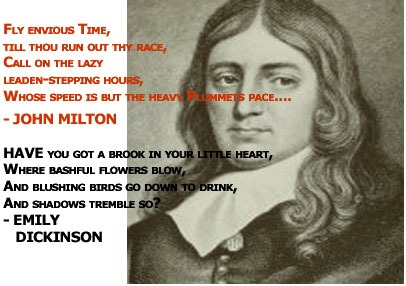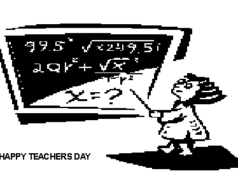John Milton
(Born 9th December 1608-8th November 1674)
‘The mind in its own place and in itself
Can make a heaven of hell, a hell of heaven.- Paradise Lost
‘What if earth Be but the shadow of heaven and things therein,
Each to other like, more than on earth is thought?’ – Paradist Lost
John Milton was an English Poet and a political writer. He was one of the three children, born in this father’s shop in Bread Street in London. His father was an amateur Musician and a Composer. John Milton attended St. Paul’s School and then Christ’s college at Cambridge University. His colleagues nicknamed him ‘Lady of Christ’ for his feminine face and precise conduct. However, Milton was not deterred with any remarks and while at Cambridge wrote poems and prepared himself for a religious career, dedicating himself to God’s service as a poet.
In 1632, after graduating, Milton went to his countryplace where he wrote his two major pieces ‘Comus’ and ‘Masque’ which was dramatic presentation with music. Later, Milton supported Puritan cause through a series of political writings and gradually with the sweeping change in political scenario, Milton turned away from poetry for a brief period to work on behalf of Parliament and common wealth through his prose.
Milton married 16 year old Mary Powell in 1643 but their marriage was unhappy. His work and constant study strained his weak eyes and he was completely blind by 1652. About his blindness, he wrote a sonnet ‘How my light is spent’ in 1655. John Milton wrote his masterpieces ‘The Paradise Lost’, ‘Paradise Regained’ and ‘samson Agonistes’ during his final years, composed first two works after he was totally blind. In ‘Paradise Lost’, John Milton justifies the ways of God to man. It retells the story of Bible and creation and the fall of Adam and Eve against the backdrop of Satan’s rebellion against God and expulsion from heaven. Milton studied classical greek and latin authors and was, greatly influenced by them. He died on 8th November 1608 due to gout and was buried with his father in St. Giles, Cripplegate, London.
SONG ON MAY MORNING
Now the bright morning Star, Dayes harbinger,
Comes dancing from the East,
And leads with her The Flowry May,
who from her green lap throws The yellow Cowslip, and the pale Primrose.
Hail bounteous May that dost inspire Mirth and youth,
and warm desire, Woods and
Groves, are of thy dressing, Hill and Dale,
doth boast thy blessing.
Thus we salute thee with our early Song,
And welcom thee, and wish thee long.
ON THE MORNING OF CHRIST’S NATIVITY (Compos’d 1629)
1
THIS is the Month, and this the happy morn Wherin the Son of Heav’ns eternal King, Of wedded Maid, and Virgin Mother born, Our great redemption from above did bring; For so the holy sages once did sing, That he our deadly forfeit should release, And with his Father work us a perpetual peace.
2
That glorious Form, that Light unsufferable, And that far-beaming blaze of Majesty, Wherwith he wont at Heav’ns high Councel-Table, To sit the midst of Trinal Unity, He laid aside; and here with us to be,
Forsook the Courts of everlasting Day, And chose with us a darksom House of mortal Clay.
3
Say Heav’nly Muse, shall not thy sacred vein Afford a present to the Infant God? Hast thou no vers, no hymn, or solemn strein, To welcom him to this his new abode, Now while the Heav’n by the Suns team untrod, Hath took no print of the approching light, And all the spangled host keep watch in squadrons bright?
4
See how from far upon the Eastern rode The Star-led Wisards haste with odours sweet, O run, prevent them with thy humble ode, And lay it lowly at his blessed feet; Have thou the honour first, thy Lord to greet, And joyn thy voice unto the Angel Quire, From out his secret Altar toucht with hallow’d fire.
PARADISE LOST BOOK REVIEW
Paradise Lost is about Adam and Eve – How they were created and how they lost their place in the Garden of Eden, also called Paradise. It’s the same story you find in the first pages of Genesis, expanded by Milton into a very long, detailed, narrative poem. It also includes the story of the origin of Satan. Originally, he was called Lucifer, an angel in heaven who led his followers in a war against God, and was ultimately sent with them to hell. Thirst for revenge led him to cause man’s downfall by turning into a serpent and tempting Eve to eat the forbidden fruit.
The story opens in hell, where Satan and his followers are recovering from defeat in a war they waged against God. They build a palace, called Pandemonium, where they hold council to determine whether or not to return to battle. Instead they decide to explore a new world prophecied to be created, where a safer course of revenge can be planned. Satan undertakes the mission alone. At the gate of hell, he meets his offspring, Sin and Death, who unbar the gates for him. He journeys across chaos till he sees the new universe floating near the larger globe which is heaven. God sees Satan flying towards this world and foretells the fall of man. His Son, who sits at his right hand, offers to sacrifice himself for man’s salvation. Meanwhile, Satan enters the new universe. He flies to the sun, where he tricks an angel, Uriel, into showing him the way to man’s home.
Satan gains entrance into the Garden of Eden, where he finds Adam and Eve and becomes jealous of them. He overhears them speak of God’s commandment that they should not eat the forbidden fruit. Uriel warns Gabriel and his angels, who are guarding the gate of Paradise, of Satan’s presence. Satan is apprehended by them and banished from Eden. God sends Raphael to warn Adam and Eve about Satan. Raphael recounts to them how jealousy against the Son of God led a once favored angel to wage war against God in heaven, and how the Son, Messiah, cast him and his followers into hell. He relates how the world was created so mankind could one day replace the fallen angels in heaven.
Satan returns to earth, and enters a serpent. Finding Eve alone he induces her to eat the fruit of the forbidden tree. Adam, resigned to join in her fate, eats also. Their innocence is lost and they become aware of their nakedness. In shame and despair, they become hostile to each other. The Son of God descends to earth to judge the sinners, mercifully delaying their sentence of death. Sin and Death, sensing Satan’s success, build a highway to earth, their new home. Upon his return to hell, instead of a celebration of victory, Satan and his crew are turned into serpents as punishment. Adam reconciles with Eve. God sends Michael to expel the pair from Paradise, but first to reveal to Adam future events resulting from his sin. Adam is saddened by these visions, but ultimately revived by revelations of the future coming of the Savior of mankind. In sadness, mitigated with hope, Adam and Eve are sent away from the Garden of Paradise.








